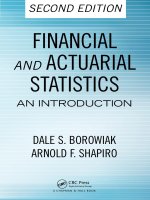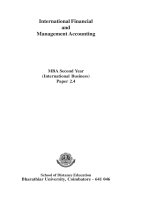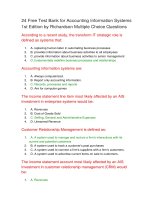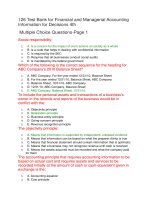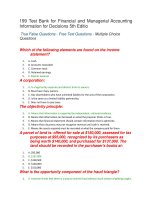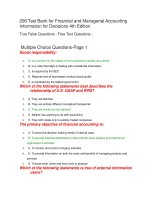228 test bank for financial and management accounting an introduction 4th
Bạn đang xem bản rút gọn của tài liệu. Xem và tải ngay bản đầy đủ của tài liệu tại đây (351.6 KB, 73 trang )
228 Test Bank for Financial and Management
Accounting An Introduction 4th
Multiple Choice Questions - Page1
Jayantha commenced business on 1 January 20x6 with a capital in
cash of £10 000. During the year ending on 31 December 20x6 he
paid £12 000 for furniture, £92 400 for purchasing goods for sale and
£31 450 for various expenses. He received £139 250 by sale of
goods. Identify Jayantha’s capital as at 31 December 2001 in the
following situation: Jayantha had sold out all goods purchased during
the year and wishes to write off a tenth of the cost of furniture as
depreciation.
1.
A) £24 200
2.
B) £10 000
3.
C) £24 400
M Biggs bought several lots of inventory (stock) throughout a period
for the following amounts £1 100, £2 200, £3 300, £4 400. He made
sales on credit throughout this period of £1 100, £2 200, £3 300, £4
400. He sells inventory (stock) at cost plus 25%. His closing inventory
(stock) at the end of the period is valued at:
1.
A) 2 200
2.
B) 3 300
3.
C) zero
4.
D) 4 400
Identify whether the balance brought down, at the year end, in the
named account would be on the debit side or credit side of that
account. Bank Loan a/c
1.
A) credit
2.
B) debit
The total of credit sales found within a sales ledger control account
comes from:
1.
A) the sales day book
2.
B) the sales ledger
3.
C) the trial balance
4.
D) the cash book
Identify the account to which you would post the following transactions
recorded in the Cash Account:£2 500 paid for a steel cabinet to
securely lock up the books of account.
1.
A) furniture account
2.
B) accounts safe a/c
3.
C) steel cabinet a/c
Identify whether the balance brought down, at the year end, in the
named account would be on the debit side or credit side of that
account. Shop fittings a/c
1.
A) debit
2.
B) credit
Identify whether the account stated below would represent an Asset,
Liability, Income or Expenditure: Purchases a/c
1.
A) asset
2.
B) expenditure
3.
C) liability
4.
D) income
Which of the following reflects the effect on the accounting equation of
a purchase of an item of plant and equipment, for cash?
1.
A) assets increase: ownership interest decreases
2.
B) assets unchanged: ownership interest unchanged
3.
C) assets decrease: ownership interest increases
4.
D) assets decrease: ownership interest unchanged
Identify the year-end balance that would be brought down in the
following account on 31 December 20x6, taking into account the
stated transaction: Office Equipment account: The balance in the
account on 1 December 20x6 was £218 400. In December four
personal computers were bought for staff use, paying £4 500 for each
unit.
1.
A) £200 400
2.
B) £236 400
3.
C) £218 400
For the purpose of establishing the accuracy of the individual personal
ledger balances, a business maintains, on a memorandum basis, a
Sales Ledger Control account (S.L.Cont) and a Purchases Ledger
Control account (P.L.Cont). Identify the account and its side in which
you will enter Return outwards during the month: S.L.Cont. P.L.Cont.
Neither; Dr Cr Dr Cr a b c d e
1.
A) b
2.
B) c
3.
C) a
4.
D) d
5.
E) e
Which of the following is the correct terminology for the right hand side
of a ledger account?
1.
A) positive
2.
B) debit
3.
C)credit
4.
D) negative
Which of the following statements is correct? A trial balance:
1.
A) lists the balances in all the accounts maintained on a double entry basis
2.
B) is prepared by a business on the last day of its accounting period
3.
C) proves the accuracy of the accounting records
4.
D) lists all entries made for accounting for business transactions
When preparing a bank reconciliation statement, the balance as
shown in the bank statement is reconciled with:
1.
A) the bank's account in the business's payables (creditors)' ledger
2.
B) the bank balance as shown in the previous balance sheet
3.
C) the bank balance as shown in the bank’s ledger
4.
D) the bank balance as shown in the business's cash book
Identify whether the balance brought down, at the year end, in the
named account would be on the debit side or credit side of that
account. Stationery account
1.
A) credit
2.
B) debit
Identify whether the balance brought down, at the year end, in the
named account would be on the debit side or credit side of that
account. Machinery a/c
1.
A) credit
2.
B) debit
Identify whether the account stated below would represent an Asset,
Liability, Income or Expenditure: Bank Loan a/c
1.
A) income
2.
B) asset
3.
C) expenditure
4.
D) liability
A business registered for Value Added Tax has to maintain a VAT
account, crediting it with the "output tax" and debiting it with the "input
tax" calculated at 17.5 / 117.5 of the transaction value. In respect of
the transaction listed below, identify whether you would account for
the VAT element by debiting or crediting the VAT account or do
neither: Cash sales
1.
A) credit
2.
B) debit
3.
C) neither
Identify whether the account stated below would represent an Asset,
Liability, Income or Expenditure: Buildings account
1.
A) liability
2.
B) income
3.
C) expenditure
4.
D) asset
Identify whether the balance brought down, at the year end, in the
named account would be on the debit side or credit side of that
account. Advertising a/c
1.
A) credit
2.
B) debit
Identify whether the posting of the transaction to the account named
would increase or reduce the balance in that account: Receipt of a
Loan from Kingsley Perera. (Perera's Loan account)
1.
A) increase
2.
B) reduce
Identify the account to which you would post the following transaction
recorded in the Cash Account: £4 000 paid to Ricky Nelson, the
landlord, as rent for the premises used for business purposes.
1.
A) Ricky Nelson a/c
2.
B) landlord's account
3.
C) rent account
The effect of a transaction was that it reduced both the assets and the
liabilities of a business by £100 000. Which of the following is that
transaction likely to be:
1.
A) introduction of additional capital by the owner
2.
B) repayment of a loan
3.
C) disposal of an asset
4.
D) sale of goods
Jayantha commenced business on 1 January 20x6 with a capital in
cash of £10 000. During the year ending on 31 December 20x6 he
paid £12 000 for furniture, £92 400 for purchasing goods for sale and
£31 450 for various expenses. He received £139 250 by sale of
goods. Identify Jayantha’s profit for the year to 31 December 2001 in
the following situation: Unsold goods remaining in hand on 31
December 20x6 had cost £24 550 and Jayantha wishes to write off the
cost of his furniture equally over six years.
1.
A) £37 950
2.
B) £38 950
3.
C) £71 400
Identify whether the posting of the transaction to the account named
would increase or reduce the balance in that account: Payments to
buy goods for sale. (Purchases account)
1.
A) increase
2.
B) reduce
Which of the following reflects the effects on the accounting equation
of a payment to trade payables (creditors)?
1.
A) assets decrease: liabilities decrease
2.
B) assets decrease: ownership interest decreases
3.
C) assets increase: liabilities decrease
4.
D) assets decrease: ownership interest increases
Every entry in a ledger should have:
1.
A) date and description
2.
B) amount
3.
C) date, description and amount
4.
D) description and amount
Identify whether the account stated below would represent an Asset,
Liability, Income or Expenditure: Sales account
1.
A) asset
2.
B) income
3.
C) liability
4.
D) expenditure
Which of the following errors would have caused a difference in the
trial balance?
1.
A)recording a sale of £30 000 as £3 000 in the Cash Book and £3 000 in the
Sales Account
2.
B)posting payment of £21 000 for stationery as £12 000 to the Stationery account
3.
C)not accounting for £15 000 paid for purchasing goods for sale
4.
D)posting to Motor vehicles account £600 paid for servicing vehicles
If a business pays a cheque for stationery, the bookkeeping entries
are:
1.
A) Debit Purchases Credit Bank
2.
B) Debit Bank Credit Stationery
3.
C) Debit Stationery Credit Bank
4.
D) Debit inventory (stock) Credit Bank
Having placed in a Suspense account the difference in the trial
balance, it is found that the difference arose because a pre-paid rent
of £12 000 has been brought down as a credit balance in the Rent
account. To correct this error which of the following entries should the
journal require:
1.
A) Debit Suspense account and credit Rent account with £24 000
2.
B) Debit Rent account and credit Suspense account with £24 000
3.
C) Debit Rent account and credit Suspense account with £12 000
4.
D) Debit Rent account with £24 000
Before inserting a closing balance, accounts representing assets or
expenses are likely to have:
1.
A)an equal amount of debit and credit entries
2.
B)only credit entries
3.
C)more debit entries than credit entries
4.
D)more credit entries than debit entries
Identify whether the balance brought down, at the year end, in the
named account would be on the debit side or credit side of that
account. Cash account
1.
A) debit
2.
B) credit
If a trial balance, extracted from the double entry system of a sole
trader, shows that total debits equals total credits then:
1.
A) the books are correct
2.
B) no errors will have been made in posting the transactions of the business
3.
C) the business is profitable
4.
D) an equal debit for every credit will have been posted and the accounts
correctly added
A 'T' account is:
1.
A) an abbreviation for the telephone account
2.
B) an account for all customers whose names begin with the letter T
3.
C) the ledger account found between the Sugar account and the Milk account
4.
D) a simple representation of a ledger account, forming the letter 'T'
The Cashier has recorded the following transaction in a Cash Book,
entering the receipts on the debit side and the payments on the credit
side. Identify which side of the named account would be posted by the
Bookkeeper. Advertising account : £240 paid for advertising the
availability of mobile phones
1.
A) debit
2.
B) credit
Which of the following events will an accountant normally not record?
1.
A) paying a bill that has been owing for 2 years
2.
B) receiving an invoice for goods purchased, but not paying for them yet
3.
C) providing a service to a customer to be paid for in the next accounting period
4.
D) agreeing to hire a new employee who will start work in the next accounting
period
A sale of £7 800 to Peter Blowes has been posted to Paul Blowes. To
correct this the journal entry should require which of the following:
1.
A) debit Sales account and credit Paul Blowes with £15 600
2.
B) debit Sales account and credit Paul Blowes account with £7 800
3.
C) debit Peter Blowes account and credit Sales account with £7 800
4.
D) debit Peter Blowes account and credit Paul Blowes account with £7 800
A trial balance will not reveal the following error:
1.
A) a credit sale of £500 to Ashley debited to Ashley account only
2.
B) a credit sale of £500 made to Ashley, posted as debit sale account £500 and
credit Ashley account £500
3.
C) a cash sale of £500 posted to sales account only
4.
D) a cash sale of £500 posted as a credit to the sales account of £500, and a
credit to cash account of £500
A business registered for Value Added Tax has to maintain a VAT
account, crediting it with the "output tax" and debiting it with the "input
tax" calculated at 17.5 / 117.5 of the transaction value. In respect of
the transaction listed below, identify whether you would account for
the VAT element by debiting or crediting the VAT account or do
neither:Acquisition of motor vehicles
1.
A)neither
2.
B)debit
3.
C) credit
A machinery acquired at a cost of £225 000, expected to be in use for
five years, with no salvage value, is to be depreciated equally over its
useful life. Annual depreciation then is:
1.
A) £22 500
2.
B) £45 000
3.
C) £112 500
4.
D) £80 000
Identify the account to which you would post the following transaction
recorded in the Cash Account:£240 paid for advertising the availability
of mobile phones for sale.
1.
A) publicity account
2.
B) advertising a/c
3.
C) expenses account
The source documents for entries made in the Return Outwards
Journal are:
1.
A) copies of Credit Notes issued to customers
2.
B) Credit Notes issued by suppliers
3.
C) purchase invoices
4.
D) copies of sales invoices
For the purpose of establishing the accuracy of the individual personal
ledger balances, a business maintains, on a memorandum basis, a
Sales Ledger Control account (S.L.Cont) and a Purchases Ledger
Control account (P.L.Cont). Identify the account and its side in which
you will enter the dishonouring ('bouncing') of a cheque received from
a customer S.L.Cont. P.L.Cont. Neither; Dr Cr Dr Cr a b c d e
1.
A) d
2.
B) c
3.
C)e
4.
D) a
5.
E) b
Identify the year-end balance that would be brought down in the
following account on 31 December 20x6, taking into account the
stated transaction: Ruth Jones' Loan account: A loan of £60 000 was
obtained from Ruth on 1 January 20x5, on an agreement that it will be
settled in six annual instalments of £10 000 each commencing from 31
December 20x5. The agreement is being complied with.
1.
A) £40 000
2.
B) £60 000
3.
C) £50 000
Identify whether the balance brought down, at the year end, in the
named account would be on the debit side or credit side of that
account. Salaries account
1.
A) credit
2.
B) debit
The Cashier has recorded the following transaction in a Cash Book,
entering the receipts on the debit side and the payments on the credit
side. Identify which side of the named account would be posted by the
Bookkeeper. Interest account : £2 000 paid as interest on Dave's
Loan
1.
A) credit
2.
B) debit
Which of the following source books (books of prime entry) will not be
required in a 'cash' business?
1.
A) Sales Ledger
2.
B) Nominal Ledger
3.
C) Petty Cash Account
4.
D) Bank Account
If the net assets of a business totalled £540 000 and its liabilities
totalled £316 800, its total assets on that date would amount to:
1.
A) £223 200
2.
B) £856 800
3.
C) £633 600
4.
D) £540 000
If a business commenced the day with £14 200, paid out £58 900
during the day and has £22 900 by the end of the day, it should have
received during the day:
1.
A) £1 400
2.
B) £67 600
3.
C) £50 200
4.
D) £21 800
Identify the account to which you would post the following transaction
recorded in the Cash Account: £2 000 paid to Dave Nicholas as
interest on a loan.
1.
A) Dave Nicholas’s Loan a/c
2.
B) interest account
3.
C) expense account
228 Free Test Bank for Financial and Management
Accounting An Introduction 4th Edition Pauline Weetman
Multiple Choice Questions - Page 2
The Cashier has recorded the following transaction in a Cash Book,
entering the receipts on the debit side and the payments on the credit
side. Identify which side of the named account would be posted by the
Bookkeeper. Rent account : £4 000 paid to Ricky Nelson as rent for
business premises
1.
A) credit
2.
B) debit
How would you define the “net assets” of a business?
1.
A) Total assets + liabilities
2.
B) Owner’s capital + Liabilities
3.
C) Total assets - Owner’s Capital
4.
D) Total assets - Liabilities
If a sales invoice for £98 500 is not recorded in the Sales Day Book,
the effect of the error on the trial balance would be:
1.
A) the trial balance will balance
2.
B) total of the credit side will exceed that of the debit side by £98 500
3.
C) total of the debit side will exceed that of the credit side by £98 500
4.
D) total of the debit side will exceed that of the credit side by £197 000
The accounting entries for recording £100 000 cash introduced by the
owner of a business are:
1.
A) debit Cash account and Credit Owner’s account
2.
B) credit Cash account and Debit Investment in business account
3.
C) debit Cash account and Credit Capital account
4.
D) debit Cash account and Credit Investments account
Which one of the following is an impersonal ledger?
1.
A) receivables (debtors) ledger
2.
B) sales ledger
3.
C) purchases ledger
4.
D) general ledger
Which one of the following statements is incorrect? According to the
rules of double entry:
1.
A) a credit entry increases the balance in income and liability account
2.
B) a debit entry increases the balance in the assets and expenditure accounts
3.
C) a debit entry decreases or eliminates balances in income and liability
accounts
4.
D) a debit entry increases the balance in the Capital account
Identify the account to which you would post the following transaction
recorded in the Cash Account: £40 paid to buy fuel for a business
vehicle
1.
A) Motor Vehicles a/c
2.
B) vehicle running a/c
3.
C) depreciation account
A decrease in an asset will be recorded:
1.
A) on the debit side of the ledger account for the asset
2.
B) on the credit side of the ledger account for the asset
3.
C) on both sides of the ledger account for the asset
4.
D) nowhere in the ledger accounts
A business registered for Value Added Tax has to maintain a VAT
account, crediting it with the "output tax" and debiting it with the "input
tax" calculated at 17.5 / 117.5 of the transaction value. In respect of
the transaction listed below, identify whether you would account for
the VAT element by debiting or crediting the VAT account or do
neither: Expense (telephone)
1.
A) neither
2.
B) credit
3.
C) debit
Which of the following economic actions reduces the amount of
ownership interest?
1.
A) a payment of administration wages
2.
B) a receipt of cash from receivables (debtors)
3.
C) a receipt of a loan from the owner’s brother
4.
D) a payment of cash to trade payables (creditors)
Identify whether the balance brought down, at the year end, in the
named account would be on the debit side or credit side of that
account. Van repairs account
1.
A) debit
2.
B) credit
Which of the following is not a debit balance?
1.
A) Taxation Paid
2.
B) Wages and Salaries
3.
C) Cost of Buildings
4.
D) Capital Account
A supermarket pays the wages of its staff by credit transfer from its
bank account. The entries in the supermarket's accounts should be:
1.
A) Debit: Bank, Credit: Wages
2.
B) Debit: Wages, Credit: Staff creditors
3.
C) Debit: Wages, Credit: Bank
4.
D) Debit: Wages, Credit: Cash
Identify whether the posting of the transaction to the account named
would increase or reduce the balance in that account: Owner took
some cash for his personal needs. (Capital account)
1.
A) increase
2.
B) reduce
The Cashier has recorded the following transaction in a Cash Book,
entering the receipts on the debit side and the payments on the credit
side. Identify which side of the named account would be posted by the
Bookkeeper. Sales account : £360 received from selling mobile
phones
1.
A) credit
2.
B) debit
Identify whether the posting of the transaction to the account named
would increase or reduce the balance in that account: Part repayment
of Kingsley Perera's Loan. (Perera's Loan account)
1.
A) reduce
2.
B) increase
£30 000 being part repayment of a loan and £12 000 being interest
due on the loan have both been credited in the Cash Account. The
corresponding debit should be:
1.
A) £42 000 in the relevant loan account
2.
B) £30 000 in the loan account
3.
C) £30 000 in the loan account and £12 000 in Interest on loan account
4.
D) £18 000 in the loan account
A business registered for Value Added Tax has to maintain a VAT
account, crediting it with the "output tax" and debiting it with the "input
tax" calculated at 17.5 / 117.5 of the transaction value. In respect of
the transaction listed below, identify whether you would account for
the VAT element by debiting or crediting the VAT account or do
neither: Credit sales
1.
A) debit
2.
B) credit
3.
C) neither
The following are business transactions of a retailer: Purchased 150
items at cost £4 each for cash. Delivered 110 items to customers for
cash at a selling price of £6.50 per item. What is the total profit of the
retailer?
1.
A) £875
2.
B) £440
3.
C) £115
4.
D) £275
For the purpose of establishing the accuracy of the individual personal
ledger balances, a business maintains, on a memorandum basis, a
Sales Ledger Control account (S.L.Cont) and a Purchases Ledger
Control account (P.L.Cont). Identify the account and its side in which
you will Cash purchases during the month: S.L.Cont. P.L.Cont.
Neither Dr Cr Dr Cr a b c d e
1.
A) e
2.
B) b
3.
C) a
4.
D) c
5.
E) d
Identify whether the account stated below would represent an Asset,
Liability, Income or Expenditure: Staff Loan account
1.
A) asset
2.
B) expenditure
3.
C) liability
4.
D) income
For the purpose of establishing the accuracy of the individual personal
ledger balances, a business maintains, on a memorandum basis, a
Sales Ledger Control account (S.L.Cont) and a Purchases Ledger
Control account (P.L.Cont). Identify the account and its side in which
you will enter Credit sales during the month: S.L.Cont. P.L.Cont.
Neither Dr Cr Dr Cr a b c d e
1.
A) d
2.
B) a
3.
C) b
4.
D) c
5.
E) e
A trial balance is a list of:
1.
A) all the firm's assets and liabilities
2.
B) all the firm's receivables (debtors) and trade payables (creditors)
3.
C) all the debit and credit balances in the accounts
4.
D) all the transactions in a ledger
Which of the following is not a book of prime entry?
1.
A) the Ledger
2.
B) Returns Inwards Day Book
3.
C) the Petty Cash Book
4.
D) cash book
In a trial balance produced at the end of a financial period, opening
inventory (stock) is usually found:
1.
A) on the credit side
2.
B) as a note after the trial balance has been produced
3.
C) it is not shown at all
4.
D) on the debit side
Identify the account to which you would post the following transaction
recorded in the Cash Account: £360 received from selling 12 units of
mobile phone at £30 each
1.
A) earnings account
2.
B) mobile phone a/c
3.
C) sales account
A business registered for Value Added Tax has to maintain a VAT
account, crediting it with the "output tax" and debiting it with the "input
tax" calculated at 17.5 / 117.5 of the transaction value. In respect of
the transaction listed below, identify whether you would account for
the VAT element by debiting or crediting the VAT account or do
neither: Cost of goods removed by the owner for own use
1.
A) neither
2.
B) debit
3.
C) credit
The Cashier has recorded the following transaction in a Cash Book,
entering the receipts on the debit side and the payments on the credit
side. Identify which side of the named account would be posted by the
Bookkeeper. Furniture account : £2 500 paid for a steel cabinet
1.
A) debit
2.
B) credit
Which of the following will disturb the balancing of the trial balance?
1.
A) entering a wrong amount in a book of prime entry
2.
B) posting to an asset account instead of an expenditure account
3.
C) entering an acquisition of an asset, on credit terms, in the Purchases Day
Book
4.
D) error in adding up a book of prime entry
A sales control account balance which agrees with the total of the
individual sales ledger balances tells us that:
1.
A) it is unlikely that there is a double entry error in the sales ledger
2.
B) no amounts arising from sales will appear in the bank reconciliation
3.
C) it is unlikely that there is a double entry error in the ledgers as a whole
4.
D) any remaining error in the double entry must lie in the purchase ledger
For the purpose of establishing the accuracy of the individual personal
ledger balances, a business maintains, on a memorandum basis, a
Sales Ledger Control account (S.L.Cont) and a Purchases Ledger
Control account (P.L.Cont). Identify the account and its side in which
you will enter an extra general provision made for doubtful debts
S.L.Cont. P.L.Cont. Neither Dr Cr Dr Cr a b c d e
1.
A) a
2.
B) e
3.
C) c
4.
D) d
5.
E) b
The balance in the Capital account represents:
1.
A) the total of all assets of the business
2.
B) total assets of the business minus its liabilities
3.
C) cash and any other assets introduced by the owner at the commencement of
business
4.
D) the amount of cash introduced by the owner at the commencement of
business
Jayantha commenced business on 1 January 20x6 with a capital in
cash of £10 000. During the year ending on 31 December 20x6 he
paid £12 000 for furniture, £92 400 for purchasing goods for sale and
£31 450 for various expenses. He received £139 250 by sale of
goods. Identify Jayantha’s profit for the year to 31 December 2001 in
the following situation: Jayantha had sold out all goods purchased
during the year and wishes to write off a tenth of the cost of furniture
as depreciation.


